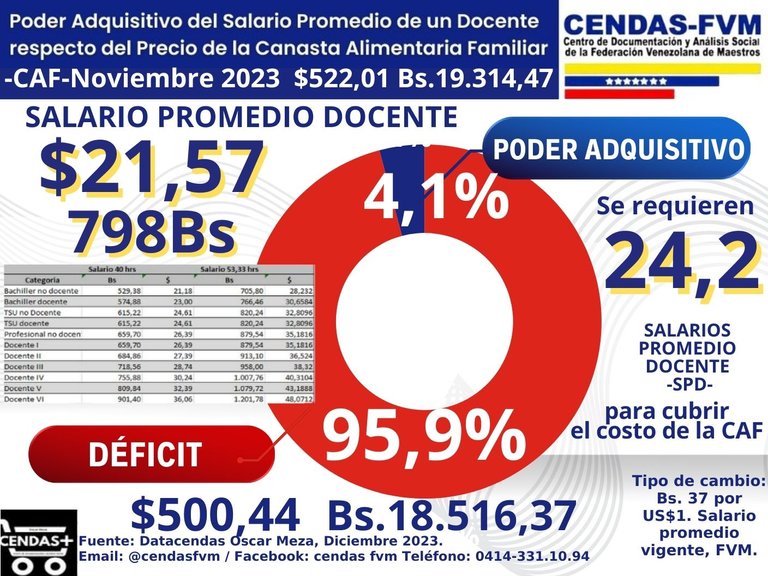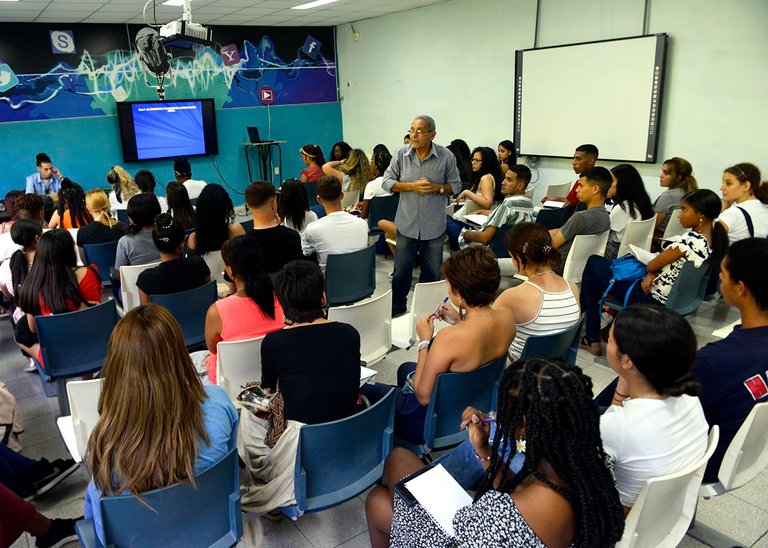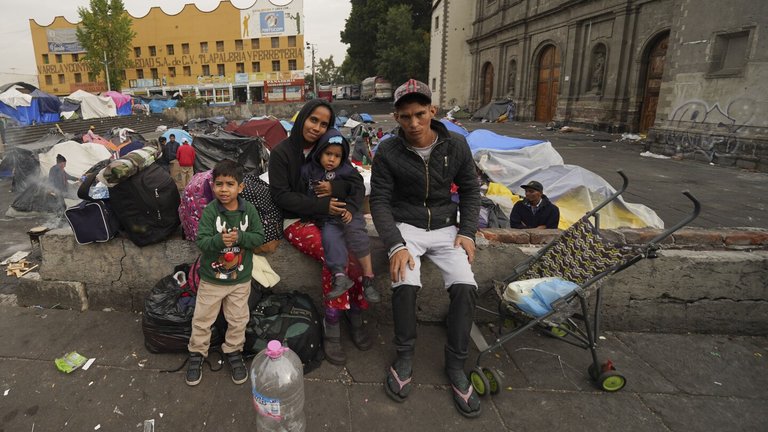The Latin American Report # 152

Teachers in danger: the salary situation of teachers in Venezuela and Cuba
The income of a Venezuelan teacher is far insufficient to guarantee the acquisition of a basic food basket. In principle, according to the Center for Documentation and Social Analysis of the Venezuelan Federation of Teachers (CENDAS in Spanish), a teacher's salary only allows for acquiring a little more than 4% of those basic consumption needs. Last month, the calculation of the latter for a family of five individuals showed a value that exceeds 520 dollars, while what a teacher receives does not cross the barrier of 22 dollars per month. As we can see, the deficit would be scandalous if we stick to the data of this NGO, which is generally respected. During the first quarter of the year, teachers started strong protests to demand improvements in salaries and their living conditions. At that time, a teacher said that "there were days when she had nothing to eat". Among the usual practices to make ends meet, those who stoically carry the bread of knowledge to their students offer private lessons, hire themselves out to private schools to be paid in dollars, and even act as cooks. For the moment, there is no light on the horizon to improve this sensitive situation.
 Source
SourceThe Cuban case
The situation in my country is not very different from the one reflected in the critical Venezuelan picture. Both nations suffer from the blunders of their governments, but also from an implacable policy on the part of the United States, that prevents the advancement of social agendas that once cushioned the position of these workers. In a classic example that illustrates the Cuban economy's collapse, it is often presented as an inverted pyramid, because those who should obtain better economic yields according to their social responsibilities and results—like teachers—are precisely the last card in the deck. In the year that is about to begin, the Government intends to implement a "macroeconomic stabilization program" that includes an immediate salary improvement for educators, since they will once again receive a bonus based on their years of seniority. This benefit was a fact until the birth of a failed plan in 2020, which is now to be corrected. The problem is that this time the State can guarantee—as it did not do 3 years ago—that the prices accompany the measure, so that this sector to which I belong breathes the fresh and clean air it deserves.
 Cuban teachers are in an extremely disadvantaged economic situation right now (source of the picture).
Cuban teachers are in an extremely disadvantaged economic situation right now (source of the picture).Mexican and U.S. authorities sell smoke and mirrors on immigration issues
I waited until very late here in Cuba for the publication of the concrete agreements reached by the U.S. and Mexican delegations that met in the Aztec capital yesterday, Wednesday. Foreign Minister Alicia Bárcena had announced that a joint communiqué would be published towards the end of the day, but so far nothing official has come out. I don't want to get too far ahead of myself, but everything indicates that a commitment was not reached to achieve a result with the urgency and forcefulness required by the ongoing crisis. The intention seems to be to plan new meetings, to carry out other consultations with the countries of origin and transit, and so on, nothing that has not already been agreed upon so many times, even less than a month ago.
The Mexican president affirmed that "important agreements were reached for the benefit of our peoples and nations", and also that "now more than ever the policy of good neighborliness is indispensable". Let's hope that it was not with this "good neighbor policy" in mind that his government ended up evicting—in a sort of demagogic wink to Blinken—a famous improvised camp located in the city of Matamoros, bordering Greg Abbott's land, although not many migrants remained there. "They ran us all off", one Honduran told the AP. Mexican authorities could thus be gaining the possibility that the Lukeville crossing will be reopened and that operations in places like Nogales will be reactivated to their full potential. That seems to have been the focus of the discussion based on Barcena's statements.
 The migrants were forced to leave a camp located near the Rio Grande. Then, many ended up fleeing to the U.S. side. This appears to be the family of the Honduran interviewed by AP (source of the image).
The migrants were forced to leave a camp located near the Rio Grande. Then, many ended up fleeing to the U.S. side. This appears to be the family of the Honduran interviewed by AP (source of the image).A large group of migrants, including children, crossed into US after Mexican immigration used bulldozers and force to move them from encampment by the river that’s been established for over a year.
— Valerie Gonzalez (@ValOnTheBorder) December 27, 2023
They’ve been stuck in river for about 12 hours and remain without food or water. pic.twitter.com/8RQvpfUHtw
Remittances continue to buoy the Nicaraguan economy
As expected, Nicaraguans abroad continue to send remittances "by the ton", confirming a pattern that had already set a record. With the annual value reported until last November, set at just over 4 billion dollars, it already exceeds by 1 billion all that received by the Nicaraguan economy for this concept in the whole of 2022, which at the time also set a record figure. In November alone, remittances approached 400 million dollars, a whopping amount that, anyway, it is important to evaluate how it is distributed from a demographic dimension. Almost 83% of the foreign currency comes, naturally, from the United States, the shelter of most of the Nicaraguan emigration, followed at a considerable distance by neighboring Costa Rica—from where about 7% is sent—, and Spain. The exodus, often politically forced, has meant a financial injection that undoubtedly contributes to that complicated picture of this Central American nation, characterized by a controversial political leadership, but at the same time by a quite acceptable economic performance beyond the remittance factor.
The quick regional roundup
Aedes aegypti bites and kills in Brazil. There have been almost 1,080 deaths from dengue fever in the South American giant this year, according to data provided by health authorities. The sad figure, for the time being, is 26 more than the final number of deaths in 2022, setting the record that was in force. Some 11,700 health professionals have been trained this year to manage arbovirus, while the highest health authority will invest around 52 million dollars in surveillance actions.
Javier Milei is in the news every day, making it clear that he did not come to play. This Wednesday he sent to Congress a bill that would grant him very broad powers to legislate according to the state of "public emergency" in which he has declared Argentina to be. If the legislature approves it, Milei would spend half of his term of office with this superpower, extendable by himself until reaching the full period for which he was "hired" to govern the nation. Among the many points that generated strong debate are the issue of the pensioners—who are at the mercy of discretionary Executive increases—, the elevation to the rank of the law of a controversial security protocol that in a certain way criminalizes social protest, and the potential authorization of the introduction of foreign military troops for certain exercises.
And this is all for our report today. I have referenced the sources dynamically in the text, and remember you can learn how and where to follow the LATAM trail news by reading my work here. Have a nice day.

